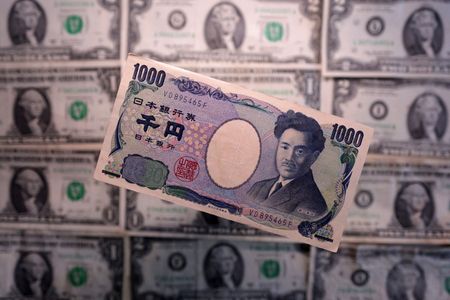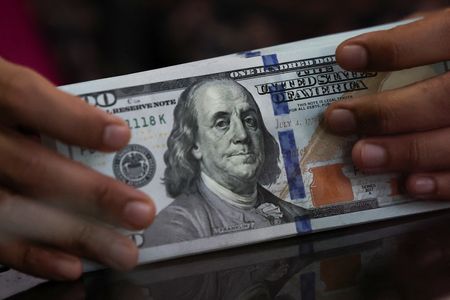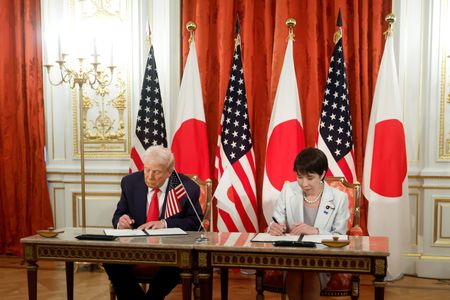By Karen Brettell
NEW YORK (Reuters) -The Japanese yen gained on Tuesday, rebounding from seven consecutive days of losses against the U.S. dollar, after comments from a Japanese minister and U.S. Treasury Secretary Scott Bessent eased some concerns about more expansive fiscal and monetary policy in the country.
Japan’s new economic revitalisation minister, Minoru Kiuchi said that Japan can boost its long-term potential growth by stimulating demand and keeping the labour market tight while being mindful of the need for fiscal discipline.
He also said that the government is closely monitoring the impact of currency moves on Japan’s economy.
“That has helped to improve sentiment around both the JGB (Japanese government bond) market and the yen,” said James Lord, head of FX and emerging market strategy at Morgan Stanley.
“I think foreign investors in particular have had a view that the Takaichi administration may be a little bit more stimulative when it comes to fiscal policy. These comments today are leaning in the other direction, that perhaps A, there may not be as much fiscal stimulus and B, the government is sensitive to movements in the yen,” Lord said.
The Japanese currency was further supported as Bessent highlighted the important role of “sound monetary policy formulation.”
“Bessent is stating a clear preference for conventional policy tools like interest rate hikes rather than FX intervention, that took dollar/yen down,” said Kamal Sharma, senior FX strategist at Bank of America.
The comments came during a meeting with Japanese counterpart Satsuki Katayama, in the latest swipe at the slow pace of interest rate hikes by the Bank of Japan (BOJ).
“That was interpreted by the market as maybe encouraging the BOJ to hike rates,” said Morgan Stanley’s Lord.
The Bank of Japan is expected to hold rates steady when it concludes its two-day meeting on Thursday, but the focus will be on whether it provides clues on the timing of the next hike.
The Japanese yen was last up 0.47% against the greenback at 152.12 per dollar.
President Donald Trump met with Japan’s new Prime Minister Sanae Takaichi in Tokyo on Tuesday, where he welcomed her pledge to accelerate a military buildup and signed deals on trade and rare earths.
The European Central Bank is also expected to leave rates unchanged after its two-day meeting on Thursday.
The U.S. Federal Reserve, meanwhile, is likely to cut rates when it concludes its two day meeting on Wednesday and traders will watch for any new clues about how policymakers view the economy.
The Bank of Canada is also widely expected to cut rates on Wednesday, though Morgan Stanley holds a non consensus view that they will leave rates unchanged.
“We think it is likely that they are going to take a skip this time, largely because the data’s been better than expected. So, we’re short USD/CAD,” said Lord.
The Canadian dollar was last up 0.11% versus the greenback to C$1.4 per dollar.
Traders are also focused on the prospect of trade deal between the United States and China ahead of a meeting between Trump and Chinese President Xi Jinping in South Korea on Thursday. “I’ve got a lot of respect for President Xi and I think we’re going to come away with a deal,” Trump told reporters on Air Force One before landing in Tokyo.
The dollar index, which measures the greenback against a basket of currencies including the yen and the euro,rose 0.02% to 98.79. The euro rose 0.04% to $1.1648.
The Australian dollar, often seen as a proxy for risk appetite, strengthened 0.15% versus the greenback to $0.6566, the highest since Oct. 10.
In cryptocurrencies, bitcoin gained 1.10% to $115,780.
(Reporting by Karen Brettell; Additional reporting by Ankur Banerjee and Lucy Raitano; Editing by Sharon Singleton and Nick Zieminski)










